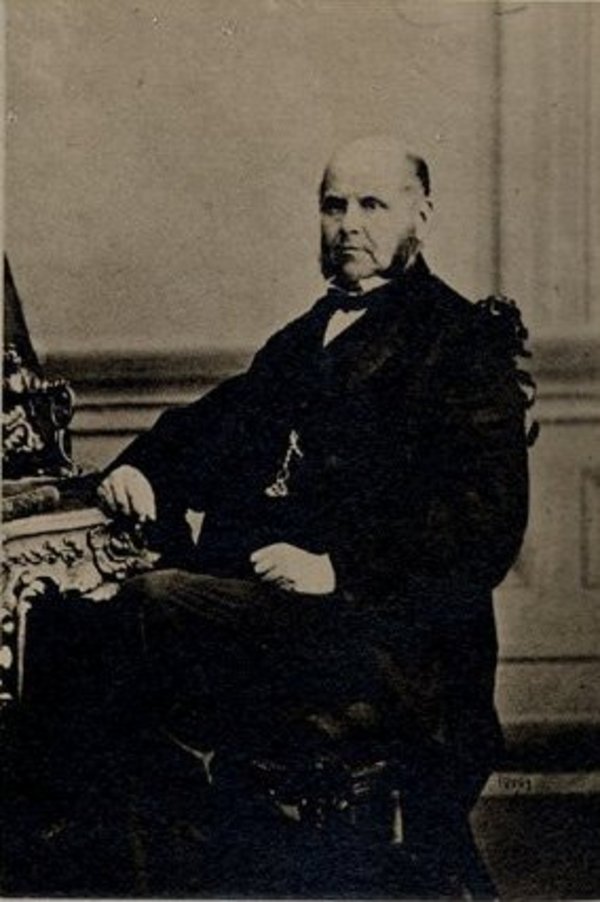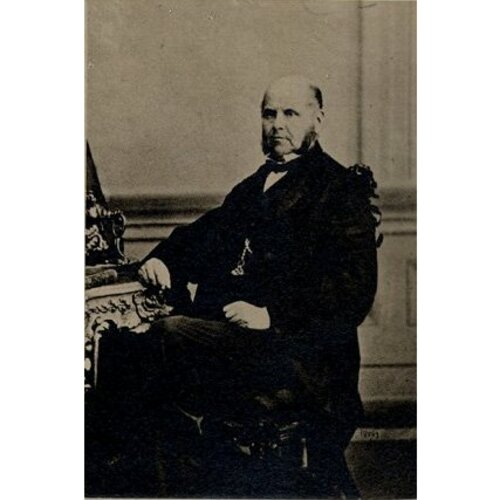
Source: Courtesy of Wikimedia Commons
ARCHAMBAULT, PIERRE-URGEL, legislative councillor, one of those responsible for founding the École d’Agriculture de L’Assomption; b. 11 Jan. 1812 at L’Assomption, L.C., of the marriage of Pierre-Amable Archambault and Madeleine Bruguière; d. 19 Aug. 1871 in the same municipality.
Pierre-Urgel Archambault was one of the descendants in the imposing line of Archambaults that sprang from Jacques Archambault and Françoise Toureault (Thoureault), who came to Canada from Dompierre-sur-Mer in 1645. A merchant’s son, Pierre-Urgel Archambault continued his father’s business at L’Assomption, which was important as a commercial centre to the northeast of Montreal before the railways were built. He was mayor of his town from 1847 to 1854, was elected legislative councillor for the division of Repentigny in 1858, and remained a councillor until 1867. Like several members of his family he joined the militia. He became major of the 1st battalion of L’Assomption in 1851, then lieutenant-colonel in 1859.
Pierre-Urgel Archambault played an important part in the establishment of an agricultural school at the college of L’Assomption. In 1866 the agricultural societies of the counties of L’Assomption, Montcalm, and Joliette requested the college authorities to establish a school of agriculture. Pierre-Urgel Archambault, president of the Société d’Agriculture of L’Assomption, and Louis Archambault*, mla for the county and in 1868 minister of agriculture and public works at Quebec, sought government support for this purpose. Their action was successful, and the superior of the college, Abbé Pierre-Férréol Dorval, was able to announce at prize-giving that the college would undertake the organizing of this school. (This prize-giving was in 1867, according to Dr Jean-Baptiste Meilleur, but Marc-A. Perron, in his book on Édouard-André Barnard*, claims it was in 1868.) One of the most distinguished teachers of the school was Isidore-Amédée Marsan*, who taught there from its inception until 1899.
The curriculum of this agricultural school was almost the same as that of the college of Sainte-Anne-de-la-Pocatière: it included theoretical and practical courses. The courses lasted two years for those who came with sufficient education. From 1864 on, the Board of Agriculture offered 20 scholarships of $50 each, which starting in 1868 were divided equally between the schools of Sainte-Anne-de-la-Pocatière and L’Assomption. In addition the government assisted in the payment of teachers’ salaries as well as with running costs. The members of the Conservative party who had helped to found the agricultural school, particularly Pierre-Urgel Archambault, continued to take a keen interest in the work, and this interest explains in great part the prosperity of the early years. One should doubtless add the active sympathy of Pierre-Joseph-Olivier Chauveau*, the superintendent of education at that time and subsequently the minister of public instruction, who gave every kind of encouragement to the establishing of professional schools, especially those designed to prepare young French Canadians for their rural vocation. Serious difficulties, however, were to arise for the school at L’Assomption when the Parti National, with Honoré Mercier*, came to power in 1887: Mercier advocated the maintenance of a single school of agriculture for the whole of Quebec. This policy was taken up in 1897 by the Liberal party, under Félix-Gabriel Marchand*, and resulted in the closing of the École d’Agriculture de L’Assomption in 1899.
In 1835, at L’Assomption, Pierre-Urgel Archambault had married Joséphine Beaupré. They had two sons and three daughters; one of the daughters, Georgine, married twice, her second husband being Louis-Olivier Taillon*, prime minister of Quebec for a few days in 1887 and from 1892 to 1896, and postmaster general of Canada in 1896. Pierre-Urgel Archambault remarried about 1862, his second wife being Louise Poulin. He was first cousin of Louis Archambault, who had six children, one being Urgel-Eugène*, the organizer of the Montreal Catholic school commission and the founder of the Académie du Plateau and the École Polytechnique of Montreal. Pierre-Urgel Archambault died on 19 Aug. 1871 at L’Assomption; he was 59 years old.
AJM, Registre d’état civil (notes biographiques fournies par J.-J. Lefebvre). J.-B. Meilleur, Mémorial de l’éducation du Bas-Canada (2e éd., Québec, 1876), 171–72. Anastase Forget, Histoire du Collège de L’Assomption (Montréal, [1933]). M.-A. Perron, Un grand éducateur agricole, Édouard-A. Barnard, 1835–98; étude historique sur l’agriculture de 1760 à 1900 (n.p., 1955), 52–56. L.-P. Audet, “Urgel-Eugène Archambault (1834–1904),” Cahiers des Dix, XXVI (1961), 143–75. J.-J. Lefebvre, “Les Archambault au Conseil législatif,” BRH, LIX (1953), 25–29.
Cite This Article
Louis-Philippe Audet, “ARCHAMBAULT, PIERRE-URGEL,” in Dictionary of Canadian Biography, vol. 10, University of Toronto/Université Laval, 2003–, accessed December 25, 2024, https://www.biographi.ca/en/bio/archambault_pierre_urgel_10E.html.
The citation above shows the format for footnotes and endnotes according to the Chicago manual of style (16th edition). Information to be used in other citation formats:
| Permalink: | https://www.biographi.ca/en/bio/archambault_pierre_urgel_10E.html |
| Author of Article: | Louis-Philippe Audet |
| Title of Article: | ARCHAMBAULT, PIERRE-URGEL |
| Publication Name: | Dictionary of Canadian Biography, vol. 10 |
| Publisher: | University of Toronto/Université Laval |
| Year of publication: | 1972 |
| Year of revision: | 1972 |
| Access Date: | December 25, 2024 |



